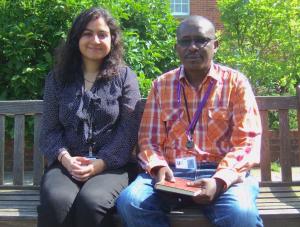You are here
- Home
- Our research students working to increase access to cancer care
Our research students working to increase access to cancer care
4 September 2019

The UK Government’s Global Challenges Research Fund (GCRF) supports cutting-edge research that addresses the challenges faced by developing countries, including a number of international development research projects at The Open University.
We talk to two recently arrived GCRF-funded PhD students (pictured above at the OU’s Walton Hall campus in Milton Keynes) about their work.
Richard Mutisya Arun
From: Nairobi, Kenya
Research topic: Ensuring sustainable medical device availability in African Health Systems: an East African case study
Supervisors: Professor Maureen Mackintosh, Dr Dinar Kale, Dr Mercy Karimi Njeru
Richard is a research officer in public health with the Kenya Medical Research Institute (KEMRI) and has worked on health systems and nutrition. He has a Masters in Public Health and Human Nutrition.
What is your research about?
My main interest is in non-communicable diseases, specifically cancer. A major problem is most low-income countries lack capacity in terms of medical devices for screening, diagnosis and treatment. I am looking to develop a model that encourages the acquisition of these devices.
Most medical devices in low-income countries are imported and most large-scale devices function for a very short time and then break down, owing to lack of support and maintenance services, or staff not being trained to operate them.
One of the most interesting areas for me is the engagement between local industry and health systems – is there a potential for being able to produce these devices locally?
I’ll be looking at the capabilities for local industry in Kenya in provision and manufacture. Are current regulations scaring away local producers? Is the procurement system the best way to do things?
And we musn’t forget the end-users – how do we get the right technology for the patients, and for the health staff? A major problem is that most cancer patients present at a fairly late stage – I want to look at the health system’s preparedness to encourage people to come for screening and check-ups.
Why did you choose The Open University?
The exposure [to different disciplines] is so wide it gives you a wider view of whatever you are looking at. You have people with different specialisations available, which is important when you are involving various stakeholders, as you will not find one person who is an expert in all the areas. Here the various elements you need for your project are within reach.
Pallavi Joshi
From: New Delhi, India
Project: Inclusive health: use of breath diagnostics for cancer detection in rural and urban India
Supervisors: Dr Dinar Kale, Dr Aravinda Guntupalli, Dr Geraint Morgan
Pallavi specializes in development and health economics. Previously, she worked for ICRIER (Indian Council for Research on International Economic Relations), a thinktank based in New Delhi, and Competition Commission of India. Her core area of research has been health policies and pharmaceutical regulations. She has a Masters in Economics.
What is your research about?
I am focusing on developing a model of ‘inclusive health’ through engagement with all the stakeholders involved, ranging from patients, health workers, clinicians, funders to policymakers.
Medical devices are critical for healthcare, but there are several challenges to their availability and access in India and across the world. I will be studying critical constraints and opportunities for generating more accessible cancer care in developing countries.
I would like to draw interlinkages between the development of health sector, evolving regulations, and the concomitant industrial development. We have witnessed rapid changes in medical technologies for both medicines and medical devices alike. More sophisticated and complex medical devices are being developed. However, regulations governing these devices are still very new and evolving.
Therefore, I am also looking at the regulatory side, including the evolution of regulations and international benchmarking, and whether the efforts of the governments are aimed at fostering the technological capabilities of the industry.
I’ll also be looking into a case study involving a new diagnostic tool developed by Dr Geraint Morgan with Oxford Micromedical Ltd, to non-invasively test for helicobacter pylori bacteria, one of the major causes of stomach cancer. Unlike existing diagnostic tests, it is non-invasive, and much cheaper.
I’ll be using this case study to look at the prospects for introducing new accessible, affordable medical technologies, particularly in India.
Why did you choose The Open University?
The focus of the research is multidisciplinary which allows the researchers to think and look out-of-the-box. One thing that really clicked for me is the work that has been done by academics in drawing interlinkages between industrial change and health sector performance. There are very few places that are pursuing such an interdisciplinary approach which looks at the technical developments using the lens of social sciences.
Richard's and Pallavi's research is funded by our GCRF Inclusive Societies Initiative.
Share this page:
Monthly Archive
- March 2024 (1)
- November 2023 (1)
- February 2023 (1)
- January 2023 (1)
- November 2022 (1)
- October 2022 (1)
Contact us
To find out more about our work, or to discuss a potential project, please contact:
International Development Research Office
Faculty of Arts and Social Sciences
The Open University
Walton Hall
Milton Keynes
MK7 6AA
United Kingdom
T: +44 (0)1908 858502
E: international-development-research@open.ac.uk
.jpg)